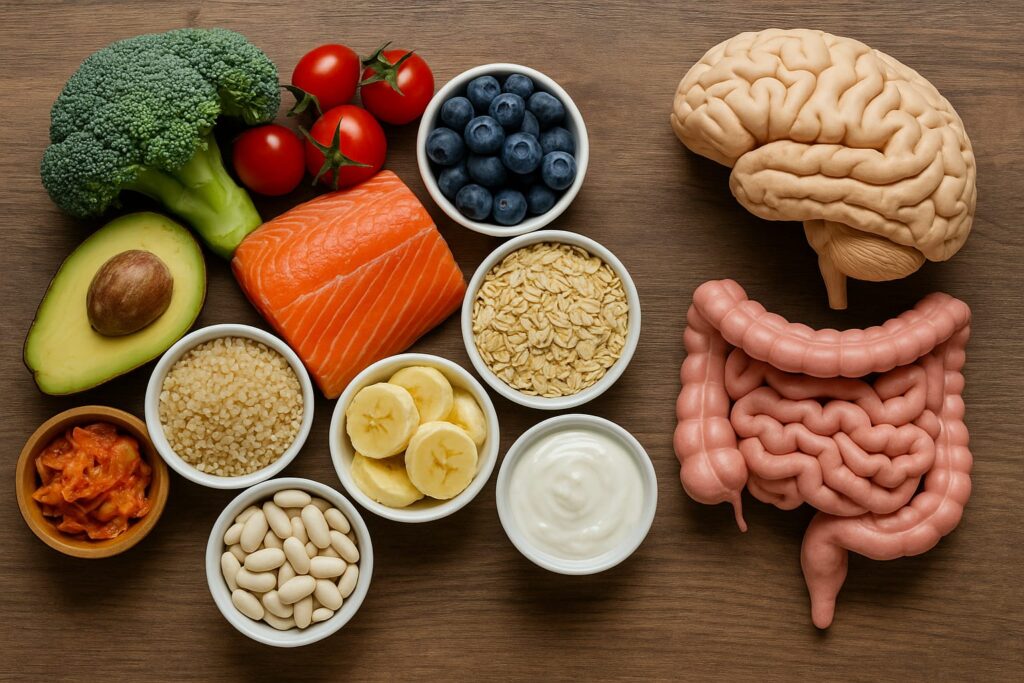How Diet Affects Mood: The Gut-Brain Link
How diet affects mood: The Power of Food on Mental Health
How diet affects mood: the gut-brain link is a fascinating topic that’s drawing increasing attention from both scientists and wellness enthusiasts. For centuries, we have separated physical health from mental well-being. Yet, modern research has unveiled a crucial biological connection between what we eat and how we feel. In fact, our gut and brain communicate continuously through a complex network of nerves, hormones, and microbes, forming what’s known as the gut-brain axis. While many people associate diet with weight management or energy levels, its role in emotional balance is just as vital.

How Diet Affects Mood: The Gut-Brain Axis Explained
How Diet Affects Mood via the Gut-Brain Connection
The gut-brain axis is the two-way communication system between your gastrointestinal tract and your brain. This link allows the gut to send and receive messages from the brain using neural, hormonal, and immune signals. Surprisingly, the gut houses over 100 million neurons, earning it the nickname “the second brain.”
The Role of the Vagus Nerve
One of the main communication highways is the vagus nerve, which connects the gut to the brainstem. When this nerve is stimulated by healthy gut bacteria, it can positively influence mood and cognitive function. Conversely, poor diet and inflammation can disrupt this pathway, leading to anxiety or depression.
How Diet Affects Mood Through the Microbiome
How Diet Affects Mood with Gut Bacteria
Your gut microbiome consists of trillions of bacteria, viruses, and fungi that live in your digestive tract. When in balance, these microbes help produce neurotransmitters like serotonin, dopamine, and GABA. In fact, around 90% of serotonin, the “feel-good” chemical, is produced in the gut, not the brain.
Diet’s Role in Shaping Microbial Balance
What you eat directly feeds or starves your gut bacteria. Fiber-rich foods, fermented products, and polyphenols promote the growth of beneficial microbes. On the other hand, diets high in sugar, refined carbs, and processed foods reduce microbial diversity and allow harmful bacteria to flourish. This imbalance, known as dysbiosis, can trigger inflammation and mood disorders.
How Diet Affects Mood Through Nutrients
Omega-3 Fatty Acids and Brain Chemistry
Omega-3s, especially EPA and DHA, are powerful anti-inflammatory agents that support cell membrane health in the brain. These fats also enhance serotonin signaling, which may explain why omega-3 supplementation has been effective in reducing symptoms of depression.
How Diet Affects Mood via Probiotics and Prebiotics
Probiotics (live beneficial bacteria) and prebiotics (fibers that feed them) play an essential role in maintaining a balanced microbiome. Regular consumption of yogurt, kefir, kimchi, sauerkraut, garlic, and bananas has been associated with improved mood and reduced anxiety.
Vitamins That Bridge Nutrition and Emotion
B vitamins, especially B6, B12, and folate, are critical for neurotransmitter production. Magnesium, zinc, and vitamin D also play a role in regulating mood. Deficiencies in any of these nutrients can negatively impact how diet affects mood through the gut-brain link.
Mood-Disrupting Foods and Habits
Sugar and Processed Foods: The Silent Saboteurs
Frequent consumption of sugary snacks and ultra-processed meals may seem comforting in the short term. However, they contribute to inflammation and blood sugar spikes, both of which interfere with emotional stability. Over time, these foods damage the gut lining and create an environment where harmful bacteria thrive.
How Diet Affects Mood Through Inflammation
Chronic inflammation, often caused by poor dietary choices, impairs neurotransmitter function and has been linked to depression. Foods high in trans fats, artificial additives, and excess omega-6 fatty acids promote this inflammatory state, negatively affecting both gut and brain health.
Case Studies: Scientific Evidence Behind the Connection
The SMILES Trial and Depression
In one of the most notable studies, the 2017 SMILES trial demonstrated that participants with depression who adopted a Mediterranean-style diet showed significantly improved symptoms compared to a control group. This study confirmed how diet affects mood through the gut-brain link in a clinically measurable way.
Other Supporting Research
Numerous observational studies also indicate that diets high in fruits, vegetables, whole grains, and lean protein are associated with better mental health outcomes. Meanwhile, Western diets, high in sugar and processed meat, have been linked with increased risk of mood disorders.
How Diet Affects Mood in Daily Practice
Start with Whole Foods
Transitioning to a diet that supports the gut-brain axis begins with reducing processed food intake and choosing whole, nutrient-dense options. Include a wide variety of vegetables, fruits, legumes, and healthy fats in your meals.
Incorporate Fermented Foods
Adding fermented foods like miso, kombucha, and tempeh can quickly improve microbial balance. These items introduce beneficial bacteria into your digestive system, supporting emotional resilience.
Monitor and Adapt
Because every gut microbiome is unique, it’s essential to observe how your mood responds to dietary changes. Keeping a food-and-mood journal for a few weeks can help you identify triggers or beneficial patterns. This self-awareness strengthens how diet affects mood through the gut-brain link in your own life.
Lifestyle Habits That Reinforce the Gut-Brain Connection
Exercise and Gut Health
Regular physical activity improves gut motility, increases microbial diversity, and supports mood-regulating neurotransmitter production. Even moderate-intensity workouts like brisk walking or yoga can make a noticeable difference.
Sleep and Circadian Rhythms
Poor sleep disrupts both gut and brain function. Establishing consistent sleep patterns allows for microbial repair and optimal neurotransmitter synthesis, further enhancing how diet affects mood via the gut-brain axis.
Myths and Misconceptions
It’s All About Calories
While calorie counting has its place, quality matters far more when it comes to mood. Nutrient density and variety are critical factors that influence gut health and emotional well-being.
Supplements Can Replace a Healthy Diet
Although supplements may help correct deficiencies, they can’t substitute for a well-rounded diet. Whole foods provide synergistic nutrients that are better absorbed and utilized by the body.
Final Thoughts on How Diet Affects Mood
To summarize, how diet affects mood: the gut-brain link is not just a theory, it’s a proven biological fact with wide-reaching implications for mental health. By paying attention to what we eat, we can nourish our gut microbiome, reduce inflammation, and enhance the natural communication between the brain and digestive system.
As awareness grows, integrating nutrition into mental health strategies will become not only common but essential. While change doesn’t happen overnight, small dietary shifts can lead to significant improvements in emotional well-being over time.
